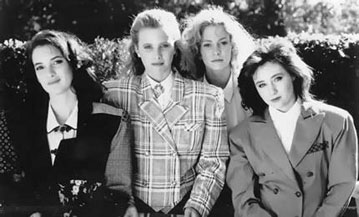Viking Night: Heathers
By Bruce Hall
January 11, 2010
Heathers was described by director Michael Lehmann as "the High School movie to end High School movies," and in some ways it was. The film mercilessly pillages all aspects of Hughesian Design - the idyllic suburban setting, vapid parents, vainglorious school administrators, over-the-top students and exaggerated social divisions - they're all there. However, lampooning John Hughes was nothing new, even back in 1989 - and if Heathers had been merely a cynical send-up of Hollywood's favorite teen angst auteur, it never would have been as memorable or controversial as it was. What Heathers happens to be is a well written and deviously original comedy in its own right, using the "John Hughes parody" template as a sounding board for something considerably more taboo. The film paints a morbid picture of the disingenuous way we often let death temporarily change our attitude toward another person. And it utilizes the concept of suicide as a catalyst and the institution of high school as its canvas. If it sounds like I'm trying to say that Heathers is a black comedy about teen suicide, I'm not because it isn't. It would be more accurate to call it a black comedy about life, death and human frailty. It just happens to take place in a high school; one whose teenage caste system has run amok, creating a fascist state with a triumvirate of despots at the top – all named Heather. And so our film drops its motley cast into this dirty, shallow fishbowl and proceeds to conduct a highly deranged social experiment on them. We're tempted to laugh, but eventually we're asked to consider whether everyone should be held accountable in an environment that allows anyone to be dehumanized.
Released in 1989, Heathers opened to mixed reviews and tepid box office. It might have dropped entirely out of existence had it not been for its release on video where the film developed a passionate following. Parents were rarely impressed but young people were drawn to the film's outrageous personalities, daring story and obvious core message - that it's who we are inside rather than how we're perceived by others that truly defines us. The movie is particularly well cast, specifically marking a key point in the careers of future stars Shannen Doherty, Winona Ryder and Christian Slater. And while I would not describe any of their individual performances as revolutionary, they and majority of the cast are ideally suited to their characters. In fact, with only a handful of exceptions it's easy to forget that you're watching actors at all, so seamless is the chemistry between most of them. Add to this a diabolically clever script crackling with stylish dialogue and the hyper realistic, surreal environment the characters inhabit, and it becomes much easier to buy the madcap chain of events that Heathers is selling.
Heather Duke (Doherty) is the junior member of the aforementioned trio of Heathers who rule their school with an iron fist, deciding on a whim who fits in and who doesn't. They are merciless in their torment and not above using anything or anyone in any way to sustain their social status. Though she's marginalized for much of the film, it's in the final act - when her character's status unexpectedly changes - that we catch a glimpse of the impudent poise for which Doherty would later be known.
Continued:
1
2
3
4




